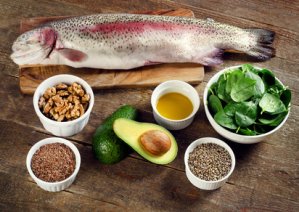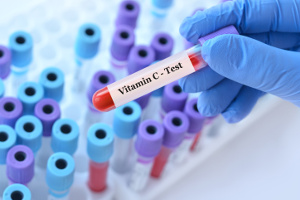Groundbreaking study: Omega-3 fatty acids inhibits cancer tumors
 If you consume too much red meat it may increase your risk of colon cancer, but is there meat with the opposite effect? According to a new and groundbreaking study, eating salmon or other good sources of omega-3 fatty acids appears to help prevent this rather common cancer form and possibly even other cancers, as well. Just make sure not to get too much omega-6, especially from margarine and other plant oils, as it is vital to have the correct balance between the two types of fatty acids.
If you consume too much red meat it may increase your risk of colon cancer, but is there meat with the opposite effect? According to a new and groundbreaking study, eating salmon or other good sources of omega-3 fatty acids appears to help prevent this rather common cancer form and possibly even other cancers, as well. Just make sure not to get too much omega-6, especially from margarine and other plant oils, as it is vital to have the correct balance between the two types of fatty acids.
According to a study from Aberdeen University in Scotland, consuming foods like salmon, chia seeds, and walnuts may improve your chances of surviving colon cancer. The omega-3 fatty acids in these foods help this potentially lethal cancer from spreading. Upon consuming foods with omega-3 fatty acids, molecules are released that attack cancer cells, making it more difficult for them to thrive and divide.
|
Colon cancer is one of the most widespread cancer forms After five years, the chance of surviving colon cancer is around 60% An estimated 50,000 Americans will die of colon cancer in 2017 |
The more omega-3 in relation to omega-6, the betterThe study included 650 patients with colon cancer, and the scientists looked at some special enzymes that are released when you eat foods with omega-3 and omega-6 fatty acids. The results were then help up against the participants’ survival chances.
It turned out that those volunteers who had the highest level of enzymes released from omega-3 fatty acids in relation to enzymes released from omega-6 fatty acids were most likely to survive, and their tumors spread at a slower rate.
Graeme Murray, who headed the study, calls it groundbreaking because science has finally mapped out the relation between different enzymes and colon cancer. The researchers also found out that consuming too much omega-6 at the expense of omega-3 may worsen the prognosis of the patients.
An earlier study that is published in Cancer Epidemiology Biomarkers & Prevention shows that omega-3 fatty acids also have a positive effect on the prevention of colon cancer. Men who had the highest blood levels of omega-3 had the lowest risk of developing colon cancer.
Omega-3 is anti-inflammatory and prevents other cancer types
In other studies, scientists have shown that one can lower the risk of prostate cancer by increasing the intake of omega-3 fatty acids, while reducing omega-6 intake. Several mechanisms are at play, where omega-3 fatty acids inhibit inflammation, limit tumor size, and block tumor growth. Omega-3 fatty acids also appear to be able to slow down the development of breast cancer.
Did you know that we humans are getting far too much omeag-6 and too little omega-3 because we eat margarine, ready meals, less fish – and because of the feed that is given to farm animals.
The important balance between omega-3 and omega-6
Omega-3 fatty and omega-6 fatty acids belong to the group of essential fatty acids that we need from our diets. The fatty acids collaborate in an intricate biochemical interplay that is of vital importance to cell membranes and to some hormone-like compounds called prostaglandins, which regulate inflammatory processes, among other things.
If we get too little omega-3 or too much omega-6, in increases our risk of inflammatory processes in the body, and we rarely feel it. Recent studies, however, suggest that chronic inflammation may contribute to the development of colon cancer and other cancer forms. That is why it is so important to maintain the correct balance between omega-3 and omega-6 fatty acids in the body.
It is mainly the omega-3 fatty acid called EPA that inhibits inflammation. EPA is found in oily fish and fish oil supplements. Vegetable sources like linseed oil, walnuts, and chia seeds contain omega-3 in the form of ALA (alpha-linolenic acid), which many people have difficulty with converting into EPA. Therefore, they are better off with the animal sources of omega-3.
Omega-3 content (in grams) per 100 grams of
|
Important: The conversion from ALA to EPA/DHA is often limited. Most people are therefore likely to benefit more from taking fish oil supplements
Get your omega-3 fatty acids from free-range salmon or from supplements
In order to increase your natural intake of omega-3 fatty acids, the scientists from Aberdeen University say, make sure to consume lots of salmon together with plenty of vegetables. They point out that it is important to choose free-range salmon from unpolluted waters. This type of salmon has a high content of an antioxidant called astaxanthin that gives the meat its pink color. Science believes that astaxanthin provides the salmon with the required antioxidant protection while swimming upstream. Free-range salmon also contains a variety of essential amino acids and minerals like selenium that have protective effect on colon cancer and other cancer forms.
The Scottish scientists warn against consuming inexpensive farmed salmon that contains far less omega-3. Moreover, the pink color in this type of salmon comes from chemical dies, not from astaxanthin. People who dislike salmon, herring or other oily fish can choose to take a high-quality fish oil supplement, instead. Fish oil based on free fatty acids and triglycerides provide good bioavailability. Make sure to choose a product that complies with government regulations with regard to peroxide count and content of environmental toxins. It is also important to know that, unlike fresh fish, fish oil supplements do not provide selenium and other essential micronutrients.
Fiskeolier bør desuden overholde myndighedernes krav til peroxidtal og miljøgifte. Man skal desuden være opmærksom på at fiskeolier ikke indeholder selen og andre essentielle næringsstoffer, som fisken bidrager med.
Things that cause colon cancer:
|
References
Eltweri AM et al. Potential of fish oils rich in omega-3 poly-unsaturated fatty acids in the management of gastrointestinal cancer. Clinical Nutrition 2017
https://www.ncbi.nlm.nih.gov/pubmed/26833289
Izabelle Z. Breakthrough science study confirms that omega-3 oils halt cancer tumors. NaturalNews.com 2017
http://www.naturalnews.com/2017-07-07-breakthrough-science-study-confirms-that-omega-3-oils-halt-cancer-tumors.html
http://www.colorectalcancer.dk/tarmkraeft/symptomer/
https://www.cancer.dk/holdoejemand/tarmkraeft/
Clark LC et al: Effects of Selenium Supplementation for Cancer Prevention in Patients with Carcinoma of the Skin. Journal of the American Medical Association. 1996
Search for more information...
- Created on .








 Most people are unaware of vitamin C’s key role in mental health and mood. According to a large population study that is published in Frontiers in Nutrition, having higher levels of vitamin C in the blood is linked to a lower risk of depression. The official dietary recommendations for vitamin C only focus on preventing the potentially lethal deficiency disease called scurvy, and things like stress, ageing, stimulant use, overweight, infections, and chronic illnesses can increase your need for the nutrient.
Most people are unaware of vitamin C’s key role in mental health and mood. According to a large population study that is published in Frontiers in Nutrition, having higher levels of vitamin C in the blood is linked to a lower risk of depression. The official dietary recommendations for vitamin C only focus on preventing the potentially lethal deficiency disease called scurvy, and things like stress, ageing, stimulant use, overweight, infections, and chronic illnesses can increase your need for the nutrient.


 "After about one week of taking the Q10 supplement I could feel a huge difference," says 23-year old Alan Piccini, who has been suffering from extreme fatigue and muscle aches ever since he was a child.
"After about one week of taking the Q10 supplement I could feel a huge difference," says 23-year old Alan Piccini, who has been suffering from extreme fatigue and muscle aches ever since he was a child. “Taking capsules with co-enzyme Q10 has freed me of the severe side effects of my cholesterol lowering medicine,” Mrs Franken explains.
“Taking capsules with co-enzyme Q10 has freed me of the severe side effects of my cholesterol lowering medicine,” Mrs Franken explains.